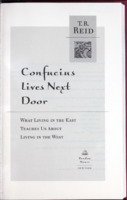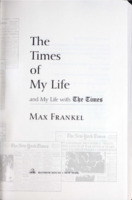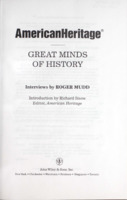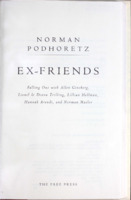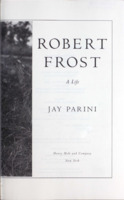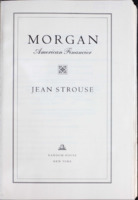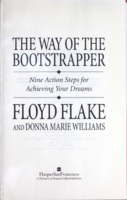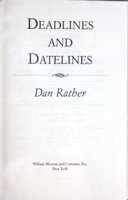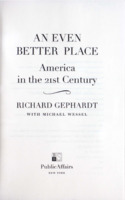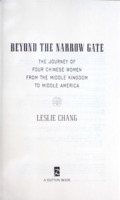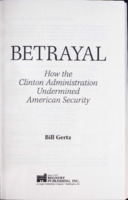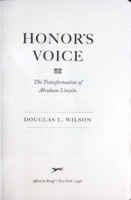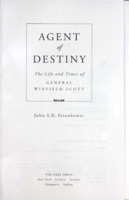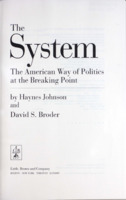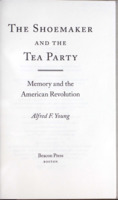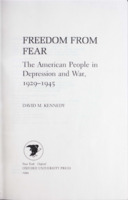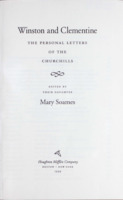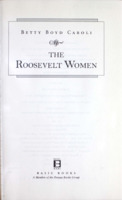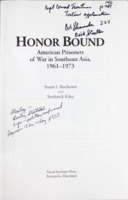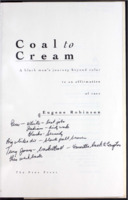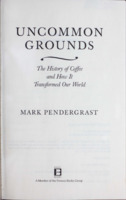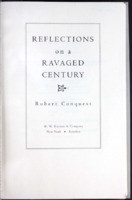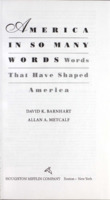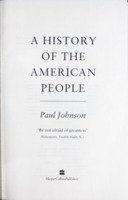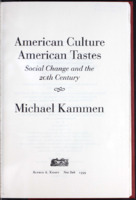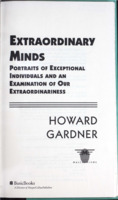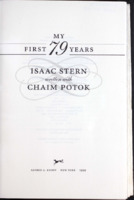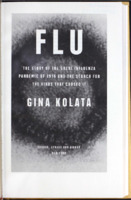Search
540 items
-
Confucius lives next door : what living in the East teaches us about living in the West
The author "uses his family's experience overseas--including mishaps and misapprehensions--to look at Asia's 'social miracle' and its origin in the ethical values outlines by the Chinese sage Confucius 2,500 years ago."--Jacket. -
The times of my life and my life with the Times
In this memoir, The New York Times's Max Frankel tells his life story the way he lived it - in tandem with the big news stories of our time. "Max Frankel started to write for The New York Times as a student at Columbia in 1949, and during the next half century he held just about every important position on the paper - foreign correspondent, Washington bureau chief, editorials editor, and executive editor." "When The Times of My Life begins, Max Frankel is a boy in Nazi Germany; we experience the terror of his wartime escape with his heroic mother, their immigrant lives in New York, and a teacher's inspired decision that he could belatedly learn to read English if he learned to write it. And so Max Frankel found his career. His book, like his life, moves through Hitler's Berlin, Khrushchev's Moscow, Castro's Havana, and the Washington of Kennedy, Johnson, and Nixon. It reevaluates the Cold War and interweaves Frankel's personal and professional lives with the era's greatest stories, from Sputnik to the Pentagon Papers, from the building of the Berlin Wall to its collapse, all the while tracking the tensions of managing the world's greatest newspaper."--BOOK JACKET. -
American heritage great minds of history
Five historians ; Stephan Ambrose, David McCullough, James McPherson, Richard White, Gordon Wood, discuss various aspects of American history. -
Ex-friends : falling out with Allen Ginsberg, Lionel & Diana Trilling, Lillian Hellman, Hannah Arendt, and Norman Mailer
Norman Podhoretz's account of the breakup of a group of New York intellectuals of the 50s and 60s. -
Robert Frost : a life
A biography of Robert Frost, the poet who won four Pulitzer prizes before dying in 1963. The book describes his early life--he wanted to be a baseball player--his farming in New England, its influence on his poetry, and his many bouts with depression and self-doubt. -
Morgan : American financier
A century ago, J. Pierpont Morgan bestrode the financial world like a colossus. The organizing force behind General Electric, U.S. Steel, and vast railroad empires, he served for decades as America's unofficial central banker: a few months after he died in 1913, the Federal Reserve replaced the private system he had devised. An early supporter of Thomas Edison and Andrew Carnegie, the confidant (and rival) of Theodore Roosevelt, England's Edward VII, and Germany's Kaiser Wilhelm, and the companion of several fascinating women, Morgan shaped his world and ours in countless ways. Yet since his death he has remained a mysterious figure, celebrated as a hero of industrial progress and vilified as a rapacious robber baron. In this account, drawn from more than a decade's work in newly available archives, biographer Jean Strouse animates Morgan's life and times to reveal the entirely human character behind the often terrifying visage.Morgan brings eye-opening perspectives to the role the banker played in the emerging U.S. economy as he raised capital in Europe, reorganized bankrupt railroads, stabilized markets in times of crisis, and set up many of the corporate and financial structures we take for granted. And surprising new stories introduce us in vivid detail to Morgan's childhood in Hartford and Boston, his schooling in Switzerland and Germany, the start of his career in New York - as well as to his relations with his esteemed and exacting father, with his adored first and difficult second wives, with his children, partners, business associates, female consorts, and friends.Morgan had a second major career as a collector of art, stocking America with visual and literary treasures of the past. Strouse's biography gives dramatic new dimension not only to Morgan but to the culture, political struggles, and social conflicts of America's momentous Gilded Age. -
We band of angels : the untold story of American nurses trapped on Bataan by the Japanese
Chronicles the experiences of ninety-nine Army and Navy nurses who were captured when the Japanese Imperial Navy attacked the American bases located in the Philippines. -
The way of the bootstrapper : nine action steps for achieving your dreams
Reverend Floyd Flake explains nine steps that can help people achieve their dreams by relying on their own personal resources. -
Deadlines and datelines
This collection of essays includes materials from Rather's weekly newspaper column, his daily [CBS] radio program, and articles written for magazines and newspapers ... Short essays, most written in 1997 and 1998, are grouped in sections on news from across America, foreign policy, national politics, personalities, and lighter topics. Libr J. -
An even better place : America in the 21st century
An Even Better Place is more than just a collection of good, common-sense ideas about what's right and what's wrong. It's a powerful, provocative statement, Gephardt's first ever, about what our priorities must be if we are to be able to get our politics and our policy back on track. Drawing from examples in his own life - his childhood in St.Louis, his career in Congress, and the lives and ideas of the many Americans he has encountered - Gephardt offers a roadmap that illuminates where we've come from, and where we need to go. Refreshingly candid, An Even Better Place is a book for everyone frustrated with the state of politics in America and everyone who believes that we can and must be better. -
Beyond the narrow gate : the journey of four Chinese women from the Middle Kingdom to Middle America
The author tells the intertwining stories of her mother and three classmates who, having already left China for Taiwan in the wake of the invasion of the Red Army, immigrated to the U.S. in the 1950s and 1960s, a time in which the Chinese were very much a minority in America. -
Betrayal : how the Clinton administration undermined American security
No reporter has done more than Bill Gertz to expose the threat the Clinton administration poses to American national security. Now, using his unrivaled access to confidential documents and sources at the Pentagon, the State Department, and the White House, Gertz tells the whole sordid story of how the Clinton administration has weakened our military, given comfort to our enemies, and endangered American safety. -
Honor's voice : the transformation of Abraham Lincoln
Examines certain aspects of the life of Abraham Lincoln in the years between 1831 and 1842, presenting him as a stubborn youth, partial to off-color jokes, and prone to depression; and traces the process by which he rose from unskilled laborer to a position of prominence in the Illinois legislature. -
Agent of destiny : the life and times of General Winfield Scott
Historian John S.D. Eisenhower, author of So Far From God and The Bitter Woods, explores the facets of Scott's career and the ways he shaped - and was shaped by - the goals and ambitions of a young republic. As Eisenhower vividly demonstrates, American history cannot be fully understood without an appreciation of Scott's life and influence.He not only presided over America's territorial expansion and, reluctantly, over the relocation of American Indians during the episode known as the Trail of Tears, but also played a leading role in the development of the United States Army from a tiny, loosely organized, politics-dominated establishment to a disciplined professional force capable of effective and sustained campaigning.Scott's career was not an uninterrupted series of successes. He was the hero of two major wars and the diplomat who prevented at least three other potential wars with Britain. Yet during his fifty years of service, Scott was placed before a military court three times and once even convicted, incurring a year's suspension from the army. He was roundly defeated when he ran for president in 1852. As Eisenhower's careful study discloses, some of Scott's troubles were created by his own political ambitions.But Scott the General was a person of monumental proportions and the key agent of America's Manifest Destiny. -
The System : the American way of politics at the breaking point
In this remarkable book, two of America's best-known journalists use their unparalleled access to the major players to examine The System, specifically as it operated during the ferocious battle over the Clinton effort to provide universal health insurance for Americans - and they come to some startling conclusions about America's future.From the beginning of the struggle, Johnson and Broder gained the confidence of more than one hundred of the participants, including the President and the First Lady; key congressional leaders like Bob Dole, Newt Gingrich, Ted Kennedy, and George Mitchell; the many competing special interests; and, outside the Beltway, ordinary citizens and workers on the battlefront of medical care. The authors have written a brilliant chronicle of the battle - of lost opportunities in the White House and of the savage determination and cunning tactics of the Gingrich forces, who plotted secretly for more than a year in advance to kill health care reform in an attempt to regain control of Congress and lead a conservative Republican Revolution that would fundamentally alter American government, privatize public function, and dismantle progressive programs and policies established over the last sixty years.Filled with stunning disclosures about the President and his supporters and adversaries, The System is an extraordinary portrait of democracy under siege, providing one of the most candid looks at American politics and government ever written. It is a book of vital importance to every American and is certain to become a classic in years to come. -
The shoemaker and the tea party : memory and the American Revolution
Award-winning historian Alfred F. Young unearths a rich story of the American Revolution with this account of George Robert Twelves Hewes, a Boston shoemaker who took part in such key events as the Boston Massacre and the Tea Party, and then served in the militia and as a seaman.Young pieces together this extraordinary tale and adds to it poignant reflections on the historical value of oral testimony and memory, and explores key questions about a time crucial in the shaping of national identity: What did it mean for the Tea Party to be claimed as an American symbol by both Boston Brahmins and the first trade unions? How do the memories of ordinary people pass into history? How should their stories be recognized by keepers of the past? Young's search leads us on an exciting journey and offers a provocative reading of American history. -
Freedom from fear : the American people in depression and war, 1929-1945
Between 1929 and 1945, two great travails were visited upon the American people: the Great Depression and World War II. Freedom from Fear tells the story of how Americans endured, and eventually prevailed, in the face of those unprecedented calamities.--Jacket. -
Winston and Clementine : the personal letters of the Churchills
In a moving commemoration of the 125th anniversary of Winston Churchill's birth, Soames, his last surviving child (Family Album, 1982; Clementine Churchill, 1979), presents a large selection of the intimate letters of Churchill and his wife, Clementine, from 1909 to 1964. Soames presents the letters both chronologically and topically, starting with the courtship and marriage of the Churchills in 1909 and swiftly moving into Churchill's long career in Parliament and the government. -
The Roosevelt women
Draws from letters, memoirs, and interviews to chronicle the lives of nine women from the Roosevelt clan, covering a period of 150 years; discussing their activities as wives, mothers, authors, campaigners, and socialites. -
Honor bound : American prisoners of war in Southeast Asia, 1961-1973
With this book, two respected scholars in the field offer a comprehensive, balanced, and authoritative account of what happened to the nearly eight hundred Americans captured in Southeast Asia. The authors were granted unprecedented access to previously unreleased materials and interviewed more than one hundred former POWs, enabling them to meticulously reconstruct the captivity record as well as produce an evocative narrative of a once sketchy and misunderstood yet key chapter of the war. "Giving due praise but never shirking from criticism, the authors describe in detail dozens of cases of individual courage and resistance, from celebrated heroes like Jim Stockdale, Robinson Risner, Jeremiah Denton, Bud Day, and Nick Rowe to lesser-known legends like Ray Schrump and Medal of Honor recipient Donald Cook."--BOOK JACKET. -
Coal to cream : a black man's journey beyond color to an affirmation of race
Robinson, an editor with the Washington Post, compares race relations and racial identity in the United States and Brazil. -
Uncommon grounds : the history of coffee and how it transformed our world
Mark Penergrast's history of coffee from its discovery to modern day. -
Reflections on a ravaged century
The main responsibility for our century's cataclysms, Conquest maintains, lies not so much in impersonal economic and social forces as in the huge mental distortions produced by ideologies like revolutionary Marxism and National Socialism. The final, sobering chapters of Reflections on a Ravaged Century concern themselves with some coming storms, notably that of the European Union, which Conquest believes is an economic, cultural, and geographical misconception divisive of the West and doomed to failure.--Jacket. -
America in so many words : words that have shaped America
In chronological order, Barnhart and Metcalf give the history and usage of words and phrases that Americans have added to the English language, from canoe and skunk in the 1500s to soccer mom, Ebonics, and millennium bug in the 1990s. -
A history of the American people
Paul Johnson's work is a reinterpretation of American history spanning from the first colonial settlements to the Clinton administration. -
American culture, American tastes : social change and the 20th century
Americans have a long history of public arguments about taste, the uses of leisure, and what is culturally appropriate in a democracy that has a strong work ethic. Michael Kammen surveys these debates as well as our changing taste preferences, especially in the past century, and the shifting perceptions that have accompanied them. "Focusing on our own time, Kammen discusses the use of the fluid nature of cultural taste to enlarge audiences and increase revenues, and reveals how the public role of intellectuals and cultural critics has declined as the power of corporate sponsors and promoters has risen. As a result of this diminution of cultural authority, he says, definitive pronouncements have been replaced by divergent points of view, and there is, as well, a tendency to blur fact and fiction, reality and illusion."--BOOK JACKET. -
Extraordinary minds : portraits of exceptional individuals and an examination of our extraordinariness
In Extraordinary Minds, a book as riveting as it is new, Gardner poses an important question: Is there a set of traits shared by all truly great achievers - those we deem extraordinary - no matter their field or the time period within which they did their important work? "In an attempt to answer this question, Gardner first examines how most of us mature into more or less competent adults. He then examines closely four persons who lived unquestionably extraordinary lives - Mozart, Freud, Woolf, and Gandhi - using each as an exemplar of a different kind of extraordinariness: Mozart as the master of a discipline, Freud as the innovative founder of a new discipline, Woolf as the great introspector, and Gandhi as the influencer." "What can we learn about ourselves from the experiences of the extraordinary? Interestingly, Gardner finds that an excess of raw power is not the most impressive characteristic shared by superachievers; rather, these extraordinary individuals all have had a special talent for identifying their own strengths and weaknesses, for accurately analyzing the events of their own lives, and for converting into future successes those inevitable setbacks that mark every life." "Gardner provides answers to a number of provocative questions, among them: How do we explain extraordinary times - Athens in the fifth century B.C., the T'ang Dynasty in the eighth century, Islamic Society in the late Middle Ages, and New York at the middle of the century? What is the relation among genius, creativity, fame, success, and moral extraordinariness? Does extraordinariness make for a happier, more fulfilling life, or does it simply create a special onus?"--BOOK JACKET. -
All souls : a family story from Southie
The anti-busing riots of 1974 forever changed Southie, Boston's working class Irish community, branding it as a violent, racist enclave. Michael Patrick MacDonald grew up in Southie's Old Colony housing project. He describes the way this world within a world felt to the troubled yet keenly gifted observer he was even as a child: [as if] we were protected, as if the whole neighborhood was watching our backs for threats, watching for all the enemies we could never really define.""--BOOK JACKET."But the threats - poverty, drugs, a shadowy gangster world - were real. MacDonald lost four of his siblings to violence and poverty. All Souls is heart-breaking testimony to lives lost too early, and the story of how a place so filled with pain could still be "the best place in the world.""--BOOK JACKET. -
My first 79 years
For sixty-four years, Isaac Stern has been a great - and greatly loved - performing artist, famous for his profound music-making, his gusto for life, his passionate dedication to sharing his knowledge and wisdom with younger musicians, and his determination in a good cause. "Brought to America from Russia when he was ten months old, Stern grew up in San Francisco and was quickly recognized as an extraordinary talent. He began performing publicly while still very young, and was soon touring across the country and around the world. His fame escalated when he led the fight to save Carnegie Hall, and again when he was the subject of the Academy Award-winning documentary film From Mao to Mozart." "In this book he shares with us both his personal and his artistic experiences: the story of his rise to eminence; his feelings about music and the violin; his rich emotional life; his great friendships and collaborations with colleagues such as Leonard Bernstein and Pablo Casals; his background as an ardent supporter of Israel; his ideas and beliefs about art, life, love, and the world we live in."--Book Jacket. -
Flu : the story of the great influenza pandemic of 1918 and the search for the virus that caused it
Unravels the mystery of this lethal virus with the high drama of a great adventure story. Kolata tracks the race to recover the live pathogen and probes the fear that has impelled government policy. She delves into the history of the flu and previous epidemics, profiles the experts hot on the trail and the amateurs woefully misguided, and details the science and the latest understanding of this mortal disease. -- Jacket.
